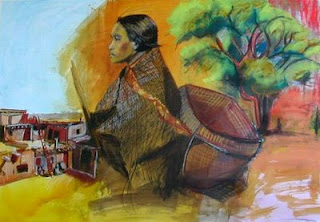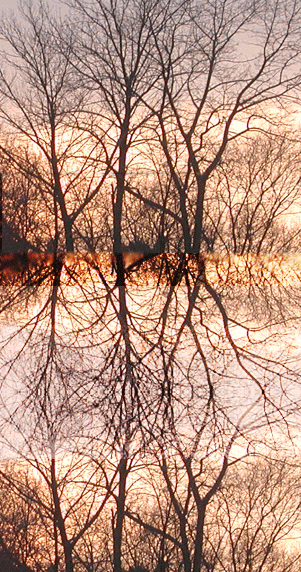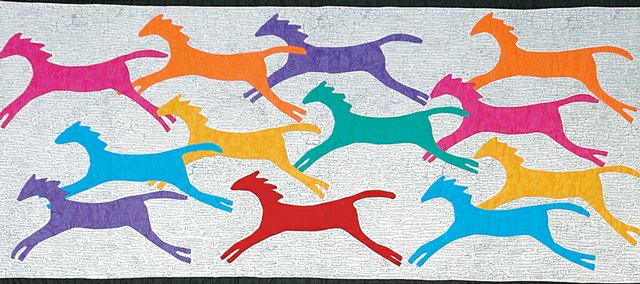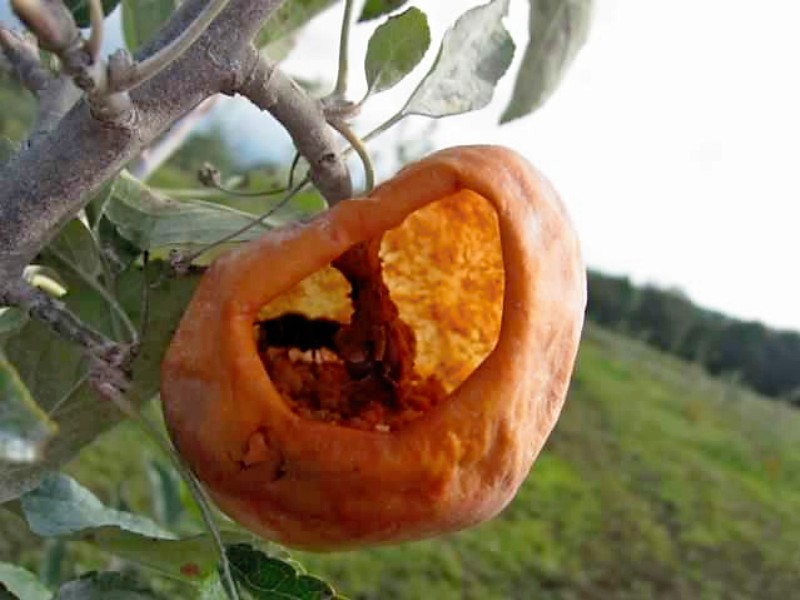Serendip is an independent site partnering with faculty at multiple colleges and universities around the world. Happy exploring!
Towards Day 7 (Wed, Sept. 27): Befriending the Bugs (?)

(hornet @ work in the Dalke family orchard, making an apple transparent)
I. coursekeeping
*weather prediction for noon: 74 degrees, 40% chance of rain, 11 mph winds...
* naming, redux
* on Monday, Sarah Shaw said, "I would be fine outside
if there were just no bugs. I want them all to disappear."
on Tuesday, Nan wrote, "How much power over them will I invoke? The temptation to strike back is very strong...from a longing to purify my own space, to ensure my physical safety. I dream about ...creating an itchless shockless universe where I might be free, free from bites and stings."
* I told my husband, the orchardist, about this honesty--and the dilemma it's creating for this class. He said, "I have, as you know I think, an innate distaste/revulsion for bugs. So I think I sympathize....Maybe one way to approach the subject is to explore the Human Microbiome project, which is a fast evolving field over the past 5-7 years...The idea that ...friendly microscopic bugs are us plays against the traditional sense of self--mind-centered, egotistical, and laden with notions of personal identity, separation and integrity (spiritual and physical)."
The Human Microbiome project aims to characterize the microbial communities found at several different sites on the human body, including nasal passages, oral cavities, skin, gastrointestinal tract, and urogenital tract, and to analyze the role of these microbes in human health and disease.
So: we can read about this.
Or! we can look around us.
Our class does not like bugs.
Many of us are scared of bugs.
We want them to disappear.
Would we ever say, about humans (of a certain kind),
"I want all ... to disappear"?
If we are "thinking ecologically, "should"
we want any sort of life form to disappear?
Do we want to stay scared...or work on this, together/alone?
So, how about: let's look @ some daddy long legs (and wasps?!)
until we're (beginning to be) not scared of them anymore....
II. coursekeeping, continued....
* by tomorrow @ 5, make your second posting about your "site sit"
(mine's up, with watercolors inspired by eetong and a poem by Nan...);
a good exercise this week might be to attend to the insect life around you....
* by Sunday @ 5, re-shape a whole paragraph of some piece of writing you've done--
this could be your first webpaper (your Thoreauvian ramble), the first or second installment of your nature writing, or even one of your web postings about visualizing the campus or etymologizing keywords.
Do this by pasting in your original, then consciously selecting and NAMING a new form that
differs from the one you (probably used unconsciously on) your original--this could be
the "rhemode' (verb-centric),
"green grammar" (however defined-->
Goatly's "nominalization"? Schleppegrell's focus on revealing real forces/
identifying institutions that result in env'l destruction?),
Snyder's "unnatural writing,"
Allen's "open/unified field perception,"
Maloof's advice on "female" nature writing ("Tell a story and put yourself in it"), or
some other mode we haven't yet seen/identified.
Comment on (compare similiarities? differences? congruences? expansions? in)
the use of such forms by least one of your classmates.
* I also remind you that I want to have a writing conference w/ each of you before fall break; we need to spread this out! This or next Friday would be GREAT; I'd like to see most of you (preferably more!) by the end of next week...please send me e-mails to schedule a conference.
III. for today, I asked you to read two essays by Gary Snyder, "Unnatural Writing" and "Language Goes Two Ways"; and then Paula Gunn Allen description's of "Three Approaches to Interpreting a Keres Indian Tale"--sorry that the copy of Allen up til 10 this morning was missing 2 pp; a complete copy is up now--and here are paper copies of what you were missing
you should see that we're moving up "levels of abstraction" in our discussion of eco-linguistics: we started with words, then looked @ grammatical structures, and are now attending both to the shape of sentences and of stories. For Monday, we're going to go even more "abstract," and consider the difference that genre makes. Please read Joseph Meeker's 1972 essay, "The Comic Mode" (one of the very earliest contributions to environmental criticism in the humanities), and Steve Mentz's much more contemporary piece on "Shakespeare, Ecological Crisis, and the Resources of Genre" (2011). The first is in the password protected file; to access the second one you need to be in the Tri-Co network/on Tripod.
III. So: have either of you ever met either of these writers before?
Gary Snyder--like Thoreau, one of the grand old men of the environmental
movement/studies; reading him @ the recommendation of that orchardist,
erstwhile poet, to whom I am related by marriage....
Paula Gunn Allen @ the forefront of Native American Studies, feminism....
Divide in 1/2s to "be" one or the other; then count off to find a new talking partner...
and (pretending to be Snyder or Allen), tell "the other" what your key ideas are:
Snyder: What is "unnatural writing"?
What does it mean to say that language goes "two ways"?
Allen: Does he challenge any of your presumptions? (He says that he does....)
Does he give you another way to think about the relationship between experience and writing...?
Then reverse: what are the "unspoken assumptions and orientations of 'our' culture,
that Gunn challenges? What is "open field"/ "unified field" perception?
What points of agreement/shared assumptions/vocabulary underlie both essays?
Where do they diverge/disagree? (Then, only then....
what do you think/what use can YOU make of these ideas...?)
What does it mean to say that "it's hard to see the forest if you are a tree"?
What's the forest, what's the tree in this metaphoric statement?
----
"Unnatural Writing" first reviews older forms of "nature writing":
* "harmonious, middlebrow, Euro-centric"
* natural history ("naively realistic," anthropocentric, good-hearted)
* "off to the side," yet profoundly present in history, philosophy, literature
* background to defining human role in the world
* classical myths (wild systems that small human populations lived near)
critical literary establishment (Nemerov) dismisses the "abyss" outside the "garden" of civilization;
dangerous language of "sustainable development" (not compatible w/ biodiversity, steady state...)
consciousness, mind, imagination and langauge are fundamentally wild:
art is (not) imposing order on chaos, but discovering measured order in it
"art of the wild": see nature as process, continually actualizing
autonomy, integrity of non-human part of the world
"depth ecology": insatiable appetite, irrational, moldy, cruel, parasitic
nocturnal, anerobic, cannibalistic, microscopic, digestive, fermentative
the decay side: blood, polution, putrefaction
shame, grief, embarrassment, fear
Narratives are a trace we leave on the world
wildness confers freedom: the ability to live in the real
physical daily world @ each moment, totally and completely
Points for a "new nature poetics":
* be nature literate
* be grounded in a place
* use Coyote/Bear/find further totems
* fear not science
* go further w/ science (be aware of problematic/contingent aspects of so-called objectivity)
* study mind, language as wild systems/habitat
* be crafty and get the work done
"Language Goes Two Ways":
popular description as that by which human beings bring order to the
chaos of the world: imposes a net of categories on an untidy universe;
but the world (ike our minds) remains unpreditable:
we can't guess our next thought...patterns are mysterious/unpredictable
languages, like the world, are naturally evolved wild systems, self-organized
it "goes two ways": gives us a window in the world, and shapes how we see it
"The menu is not the meal"--but we can see w/ language, play w/ its possibilities
creativity: seeing afresh what's already there, overlooked connections, etc:
a world away from usual education into "good language usage"
Ordinary Good Writing = well-weeded garden;
Really Good Writing = more diverse, unpredicrable, broader, deeper =
Thoreau's "tawny grammar": mother-wit, "savage, howling," yet powerfully ordered
turn around familiar view of language: not "civilized," but "wild"
cf. seeing wren, forgetting self, feeling "wren," joining larger moment...
playful writing: roaming, dreaming...
"Discipline and freedom are not opposed to each other.
We are made free by training...disciplined by choice...
a friend of 'necessity'....Just a person playing in the field of the world."
IV. How does Snyder's analysis resemble/diverge from that of

who offers us a way of reading she calls
"tribal-feminism or feminist-tribalism....
Often what appears to be a misinterpretation caused
by racial differences is a distortion based on sexual politics."
of the materials...in short, it's hard to see the forest when you're a tree."
What's the forest? What's the tree?
"Language embodies the unspoken assumptions and orientations of the culture it belongs to..."
If these two authors were in conversation,
what might they say to -- and ask -- one another?
What points of agreement/shared assumptions/vocabulary underlie both essays?
(as translated by Allen's mother's great-uncle)

- A KERES INTERPRETATION:
a narrative version of a ceremony related to the planting of corn, transfering focus of power, with assumptions...of balance and harmony...sense of rightness, or propriety...fundamental principle of proper order...ritual agency in conflict-phobic culture
- A MODERN FEMINIST INTERPRETATION:
use of passive female figure as pawn in male bid for power...
useful in instructing women in their obligation in revolutionary struggle
(assumes that conflict is basic to human experience and that
women are essentially powerless)
- AN INDIAN-FEMINIST INTERPRETATION?

- tribal habit of mind toward equilibrium of all factors
- even distribution of value among all elements in a field
- no single element foregrounded...no heroes, no villains
- no chorus, no "setting"...no minor characters...
- foreground slips along from one focal point to another until all the pertinent elements in the ritual conversation have had their say...
- focus of the action shifts...there is no "point of view"....

than of foreground-background perceptions....Traditional peoples perceive their world in a unified-field fashion that is far from the single-focus perception that generally characterizes
Western masculinist monotheistic modes of perception."
Is it even possible for us to look this way,
using unified- or open-field perception?
more synchronistic than chronological, and more dependent upon harmonious relationships of all elements within a field of perception..."
of the plot and process of a traditional tribal narrative...."




